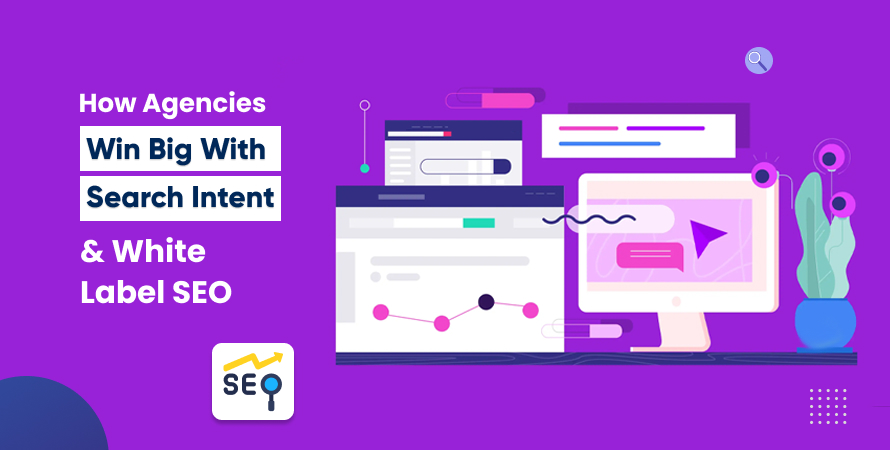How Agencies Win Big With Search Intent & White Label SEO



Understanding what users are really looking for when they type a query into Google has never been more important for marketing agencies. Known as search intent, this concept goes beyond basic keyword research and dives into what motivates a user’s search in the first place. For agencies aiming to deliver impactful SEO campaigns that genuinely meet users’ expectations, mastering search intent is non-negotiable.
At White Label SEO Providers, we help agencies like yours refine every SEO strategy through precise search intent optimization—and we do it at scale through our white label services. In this guide, we’ll break down what search intent is, why it matters deeply for agencies, common pitfalls to avoid, and how to analyze it effectively to improve your client campaigns.
What is Search Intent? A Clear Definition
Simply put, search intent refers to the underlying goal a user has when entering a search query into a search engine. Whether they’re looking for an answer, a product, or a specific website, understanding that purpose helps agencies craft content and SEO strategies that directly align with what users want.
There are four widely accepted types of search intent:
1. Informational Intent
- When a user wants to learn something or get an answer. Example: “How does SEO work?”
- These queries usually trigger blog posts, guides, or explainer content.
2. Navigational Search Intent
- When the user wants to visit a specific website or page. Example: “Ahrefs pricing page”
- Here, users already know where they want to go—they just need a shortcut.
3. Transactional Intent
- When the user is ready to take a specific action, like making a purchase or signing up. Example: “Buy keyword research tool”
- These searches typically show product pages, service pages, or sign-up forms.
4. Commercial Investigation Intent
- When the user is comparing options or researching before a purchase decision. Example: “Best SEO tools for agencies”
- These users are close to converting but still gathering data.
A thorough user search query analysis allows agencies to align their content with the exact google search intent behind these queries. Understanding these distinctions is key to mapping content effectively and improving SEO outcomes for clients.
Why Search Intent Matters for Marketing Agencies
If you’re running an agency, aligning your strategy to user intent SEO is not just helpful—it’s critical. Here’s why:
1. Better Rankings and Visibility
Google’s algorithms have advanced to recognize when content meets users search expectations. When content matches intent, it’s rewarded with higher rankings because it satisfies what searchers want to see.
For example, writing a deep, educational guide on “how SEO works” for an informational query will outperform a thin sales page targeting the same keyword.
2. Higher Engagement and Lower Bounce Rates
When visitors land on a page that delivers what they’re seeking, they stay longer, explore more, and convert more frequently. Misaligned content, on the other hand, causes them to bounce quickly—hurting SEO signals and campaign effectiveness.
3. Improved Conversion Rates
Search intent SEO allows agencies to nurture leads through every stage of the buyer journey. By crafting content that mirrors the user’s intent—whether they’re researching, comparing, or buying—you guide them naturally toward conversion.
4. Stronger Client Retention and Satisfaction
Clients want measurable results. By optimizing for user-searcher intent, agencies can demonstrate improved organic visibility, engagement, and conversions. These tangible outcomes build trust and long-term partnerships.
If your agency wants to deepen its offerings and retain more clients, leveraging expert services like our white label SEO solutions can be a strategic move to scale intent-based SEO campaigns efficiently.
The Impact of Misaligned Search Intent
Not every agency gets search intent optimization right the first time—and the consequences can be significant. Let’s explore common pitfalls and why ignoring intent damages SEO performance:
1. Higher Bounce Rates and Poor UX
Publishing a transactional landing page for a navigational search query (like “Ahrefs login”) frustrates users because they aren’t looking to buy—they just want to log in. These mismatches lead users to leave quickly, signaling poor relevance to Google.
2. Missed Ranking Opportunities
If an agency targets broad, high-volume keywords without analyzing the types of search intent, their content won’t rank competitively. For example, trying to rank a service page for an informational query (like “SEO tips”) puts the page against blog posts, making ranking nearly impossible.
3. Reduced Conversions
When user expectations aren’t met, even if your page gets traffic, it won’t convert. Misaligned content interrupts the natural buyer journey, leading to lost leads and poor ROI for clients.
How Agencies Can Identify Search Intent Effectively
Mastering user intent SEO starts with accurate analysis. At White Label SEO Providers, we prioritize these proven methods to decode intent with precision:
1. SERP Analysis
The fastest way to understand google search intent is to examine the current top-ranking pages. Does Google show blogs, product pages, videos, or comparison lists? The type of content dominating the SERP reflects the user-searcher intent.
For example, searching “best SEO tools” shows listicles and comparison posts—clear signs of commercial investigation intent.
2. Google’s “People Also Ask” and Related Searches
Exploring related queries helps agencies uncover user questions and concerns tied to a keyword. This additional context supports content mapping and search intent SEO strategies.
3. Long-Tail Keywords and Question-Based Searches
Long-tail queries often express clearer intent. A search like “how to choose an SEO agency for ecommerce” reveals not just informational intent, but a user actively considering a service.
4. Using SEO Tools
Platforms like Ahrefs, SEMrush, and Google Search Console can assist with user search query analysis. Features like keyword intent tagging and SERP feature tracking give agencies actionable insights to guide strategy.
As an agency, partnering with a white label provider that offers advanced content creation services—like our tailored solutions at White Label SEO Providers—can make intent mapping smoother and more scalable for client projects.
Enter White Label SEO: A Strategic Advantage for Agencies
By now, it’s clear that understanding and optimizing for SEO search intent can directly impact an agency’s ability to rank, engage, and convert. However, consistently analyzing, creating, and optimizing intent-aligned content for multiple clients can stretch even the most seasoned agency teams thin.
That’s where White Label SEO Providers can help. By partnering with a dedicated white label SEO provider, agencies can access scalable resources to fine-tune user search intent strategies—without the overhead of building an in-house SEO department.
Here’s how white label SEO strengthens agencies in mastering intent SEO:
1. Deep, Intent-Driven Content Creation
White label SEO providers deliver content designed to align with specific categories of search engine queries. Whether clients need in-depth blog posts, optimized landing pages, or commercial investigation-style comparison content, white label teams ensure it’s structured to match keyword search intent precisely.
We help agencies scale smarter by handling large-scale content production without sacrificing quality. You can learn more about optimizing outsourced content workflows in our guide on outsourcing content creation the right way.
2. Advanced Keyword Research and Mapping
White label partners conduct granular keyword research—not just for volume but for intent clarity. By analyzing user keyword trends and SERP behavior, we help agencies identify gaps in their client’s content and create optimized strategies that match exactly what search user queries demand.
3. Seamless Integration and Reporting
Since white label services operate under your agency’s brand, reporting and deliverables reflect your agency’s voice. This ensures consistent client communication while you retain full control of the relationship.
4. Focus on Core Business Growth
By offloading complex intent SEO tasks, agencies free up time to focus on client acquisition, account management, and other high-impact activities. You maintain agility and scale, while we handle the heavy SEO lifting in the background.
If you’re exploring how to integrate expert SEO seamlessly into your agency’s offerings, our white label SEO services provide a robust foundation to do so efficiently and effectively.
Key Benefits of Using White Label SEO for Search Intent Mastery
Let’s get specific—here are the exact benefits your agency gains by using white label SEO to sharpen your SEO search intent strategies:
1. Expert Content Mapping to User Journeys
Our white label team builds content calendars that map to each stage of the buyer journey. From highest intent transactional queries to early informational content, we ensure clients’ websites offer a full funnel experience.
2. Data-Driven Keyword Research
We look beyond volume and CPC. Our analysis pinpoints keyword search intent so that each target keyword is backed by intent clarity. This allows your campaigns to meet users exactly where they are in their journey.
3. Enhanced Technical SEO Support
Technical SEO often underpins success in search intent optimization. Our services include site structure refinement, internal linking, and schema enhancements—all of which ensure content is easily discoverable and contextually accurate.
4. Transparent Reporting and Optimization Cycles
Regular reports show not only rankings but how content aligns with user search intent over time. Continuous refinement keeps your clients ahead of evolving search patterns.
If your agency is also focused on improving content effectiveness, our post on copywriting techniques that drive sales offers actionable insights to pair with intent-aligned strategies.
How to Choose the Right White Label SEO Partner
Choosing the right partner is essential to ensure you’re offering clients best-in-class SEO aligned with user keyword behavior and intent. Here’s what to look for:
- Proven experience in SEO search intent optimization
- Case studies and transparent results
- Clear communication processes
- Flexible, scalable deliverables
We’ve covered this selection process in detail in our guide on choosing the right white label SEO partner—a must-read if you’re considering outsourcing.
Future Trends: Why Search Intent Will Only Grow in Importance
The SEO landscape continues to evolve, and so does how Google understands intent. Agencies need to stay proactive. Here’s what’s coming:
- AI-driven search experiences: Google’s SGE (Search Generative Experience) and voice search platforms will require even sharper alignment with nuanced user keyword variations.
- Semantic search evolution: Google’s focus on context means content that serves holistic user search intent will outperform keyword-stuffed pages.
- EEAT signals: Experience, Expertise, Authoritativeness, and Trustworthiness (EEAT) will continue influencing how Google ranks intent-aligned content.
By staying ahead with expert-backed strategies and partnering with white label providers like White Label SEO Providers, agencies can future-proof their client campaigns against shifting algorithms and user expectations.
Conclusion
For modern agencies, mastering SEO search intent isn’t optional—it’s a foundational element of every successful SEO strategy. From improving visibility and engagement to driving higher conversions, aligning content to the categories of search engine intent is a clear path to better client outcomes.
At White Label SEO Providers, we empower agencies to deliver scalable, intent-driven SEO strategies that meet evolving search user needs—without overstretching their teams. Whether you need help with keyword research, content mapping, or technical SEO, we’re here to support you every step of the way.
If you’re ready to deepen your SEO offerings and deliver measurable results, let’s connect and explore how our white label solutions can help.
Frequently Asked Questions (FAQs)
Search intent in SEO refers to the purpose behind a user’s search query—whether they want information, navigate to a site, or make a purchase. For agencies, aligning content to user intent helps improve rankings, boost engagement, and drive better conversions for clients.
Agencies can identify search intent by analyzing the top-ranking pages in Google, examining SERP features, using SEO tools for keyword insights, and understanding the language used in user keyword searches. These methods clarify whether the query is informational, navigational, transactional, or commercial investigation.
White label SEO helps agencies efficiently scale intent-driven strategies without expanding in-house teams. Providers handle keyword research, content creation, and technical optimization aligned with keyword search intent, allowing agencies to deliver higher-quality results to clients faster.